Jock Collins, University of Technology Sydney and Carol Reid, Western Sydney University
As the Australian population surpassed the 25 million mark last week, another immigration debate emerged over the burden newcomers are placing on Melbourne and Sydney in terms of congestion and rising home prices.
With government data showing 87% of skilled migrants settled in either of the two cities in the past year, Citizenship and Multiculturalism Minister Alan Tudge made an urgent appeal to redirect new arrivals to regional Australia instead.
New research being released publicly on Tuesday suggests Tudge is spot-on in his argument that regional Australia can take more permanent immigrants, including refugees. But the research also shows he’s wrong on another contention – that newly arrived refugees don’t want to learn English and that integration is not likely due to migrants living in a “language and cultural bubble”.
According to our survey of 155 newly arrived adult refugees and 59 children from Syria, Iraq and Afghanistan who settled in Queensland (in suburban Brisbane and in regional Logan and Toowoomba), those who settled in Toowoomba have had the easiest time integrating and feeling a part of their local communities.
A warm welcome in the country
Funded by the Australian Research Council, the findings are the first to emerge from a three-year study of settlement outcomes of recently arrived refugees in NSW, Victoria and Queensland.
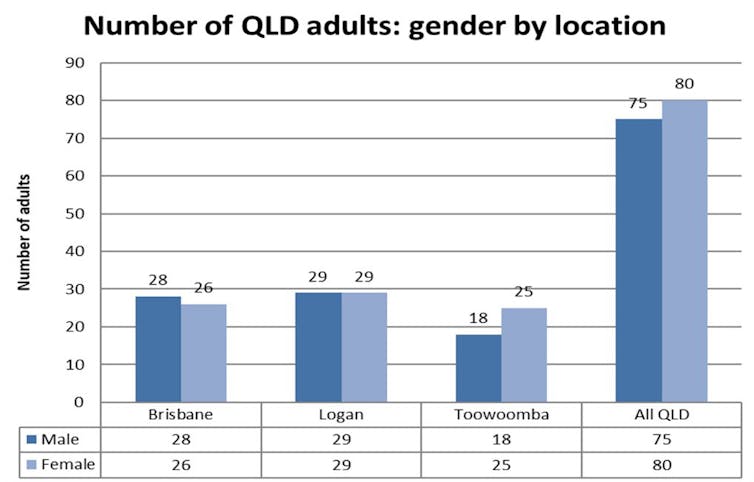
Australian Research Council, Author provided
While nearly all of the refugees surveyed in Brisbane and Logan were Christians – a consequence of the Turnbull government’s decision to take mainly Christian refugees from Syria and Iraq, Toowoomba has also settled a large number of Yazidi refugees from Iraq, who follow their own religion, and a smaller number of Muslim refugees from Afghanistan.
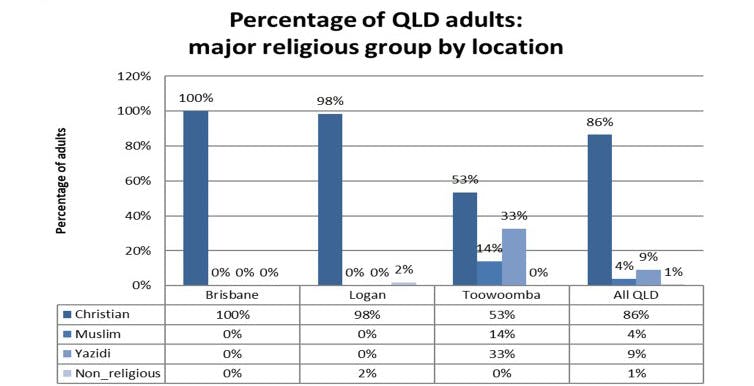
Australian Research Council, Author provided
One key issue related to immigrant and refugee settlement in regional and rural Australia relates to the warmth of the welcome. The stereotypes of the Australian bush being “redneck” would suggest new immigrants would find settlement difficult outside large metropolitan centres.
An earlier research project on immigrants living in regional Australia a decade ago, however, dispelled this myth, with 80% of respondents reporting a warm welcome.
Our new research confirmed this finding, with 68% of the refugees surveyed in Queensland overall – and 81% in Toowoomba – reporting it was “very easy” or “easy” to make friends in Australia.
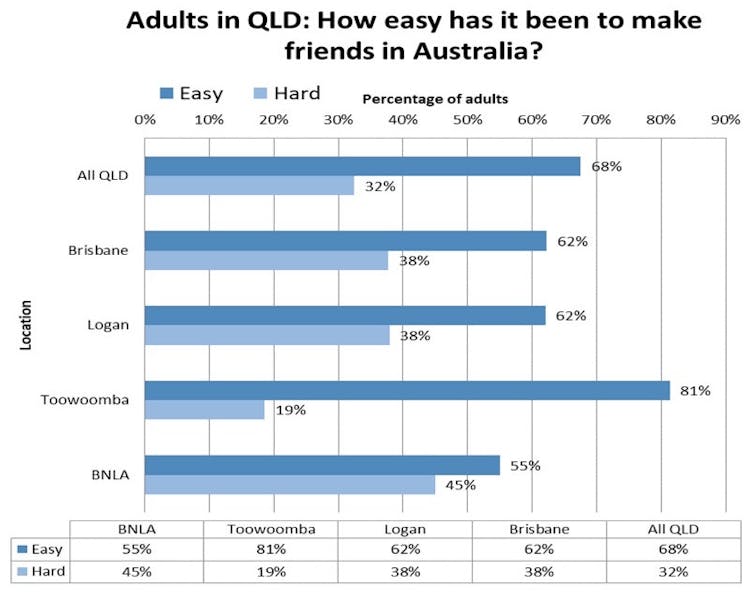
Australian Research Council, Author provided
This is also a better result than what researchers found in the larger, national survey of refugee resettlement in Australia, “Building a New Life in Australia”, which has been conducted since 2013. It’s referred to in the graph as “BNLA”.
Another indication of the “warmth of the welcome” in regional Australia is the finding that about half of the immigrants in Queensland – and 60% in Toowoomba – found it “very easy” or “easy” to talk to their Australian neighbours, a similar result to the BNLA. When we revisit these families in 2019 and 2020, we expect the numbers will even be higher.
The exception here were the immigrants who moved to Logan, who reported a lower level of ease talking with neighbours. Previous research has found a complex array of factors creates a different experience for refugees in Logan, which was one of the most disadvantaged municipalities in Australia in 2016.
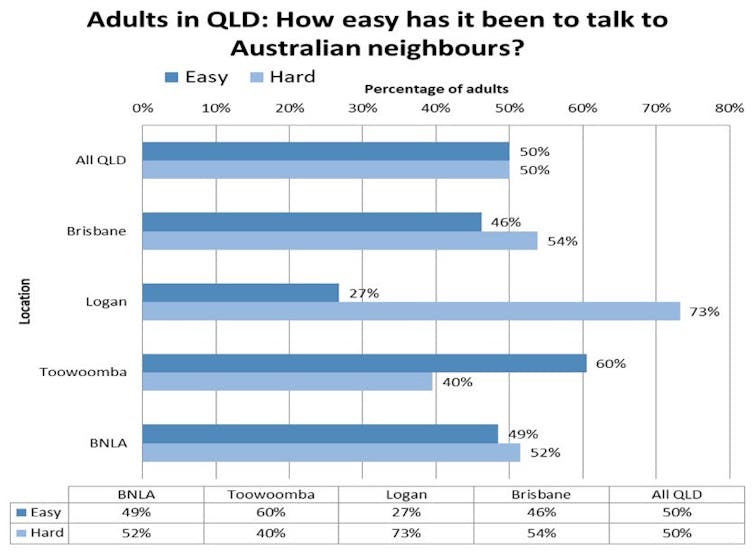
Australian Research Council, Author provided
A desire to learn English
Being able to communicate with neighbours and other people is high on the list of critical needs of the immigrants we interviewed.
Since most of these refugees had arrived in the past 12 months, a key challenge was improving their English language skills. Most wanted more opportunities for conversational English and workplace English to assist in gaining employment. But for many, this was a Catch-22. The new arrivals needed to keep applying for jobs and attend English classes, but couldn’t do both at the same time.
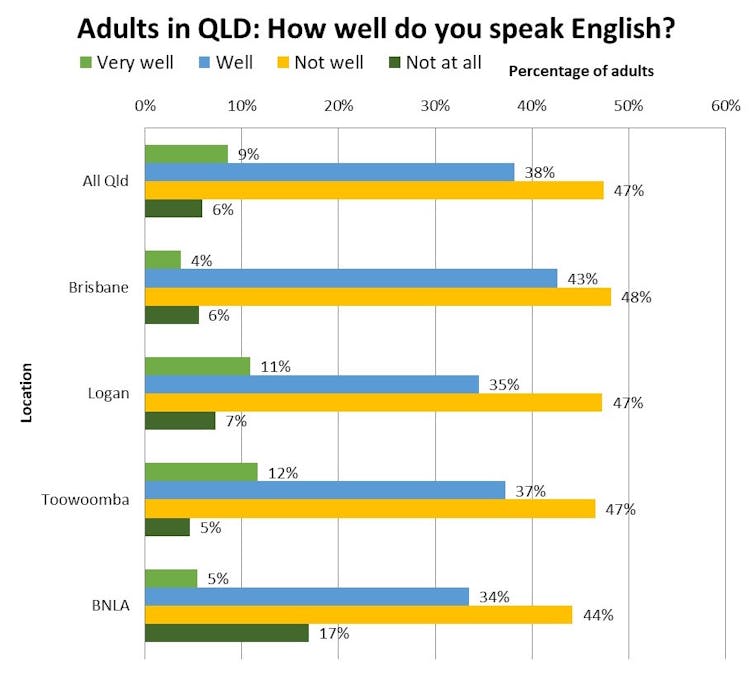
Australian Research Council, Author provided
The adult refugees we surveyed were unanimously thankful to the Australian government and people for giving them and their families the opportunity for a new life. They desperately want to give back and contribute to their new country. But most had not yet found a job in Queensland.
This is of course a national problem, as the BNLA survey shows. But in our research, we found those in regional Toowoomba fared worse than those in Brisbane. Most of the Toowoomba residents expressed a desire to stay in the community, though, and would happily do so if they could find a job.
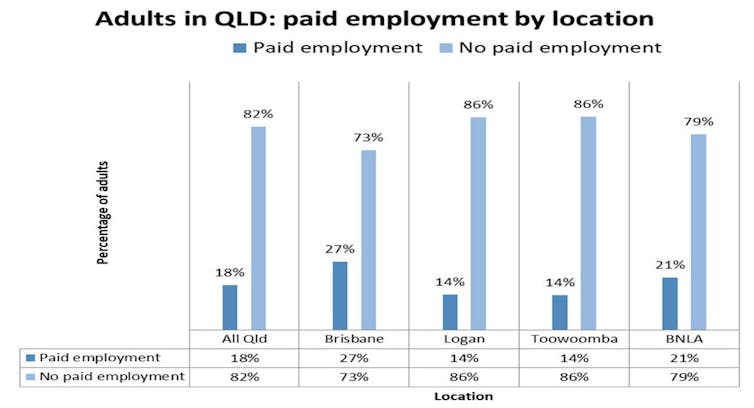
Australian Research Council, Author provided
Good place to raise children
Despite these early difficulties learning English and finding employment, an overwhelming majority of new refugees in Queensland (86%) reported feeling safe in their neighbourhoods, slightly lower than the national BNLA figure (93%). Again, Toowoomba is the standout: 100% of refugees felt safe living there.
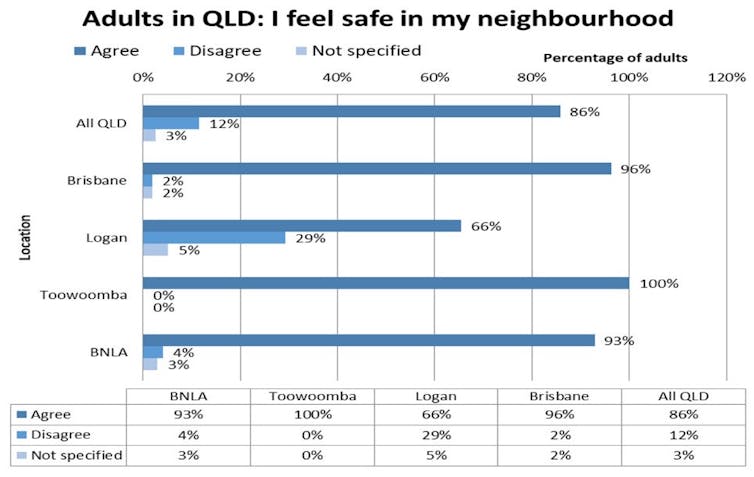
Australian Research Council, Author provided
Overwhelmingly, most respondents also felt the arduous journey from Syria and Iraq had been worth it – 85% of all Queensland respondents believe they’ve found a neighbourhood that’s a good place to bring up children.
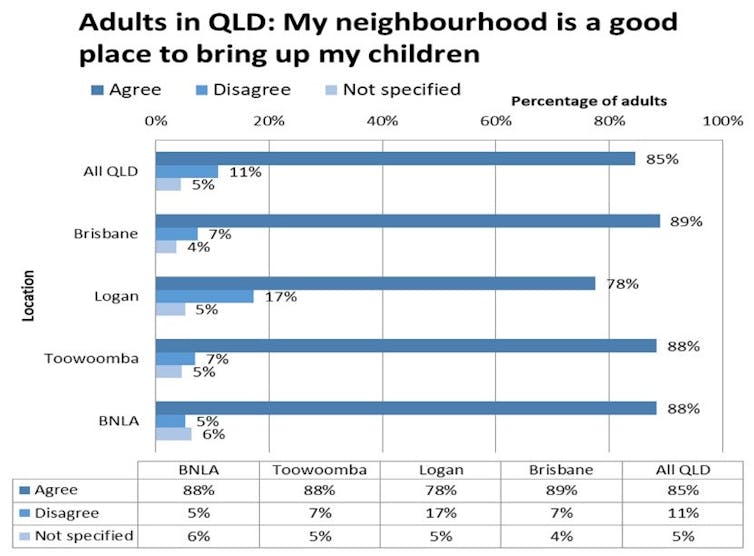
Australian Research Council, Author provided
Their children also revealed a strong sense of belonging, despite early feelings of loss and isolation. This is again higher in Toowoomba and lower in Logan – a result partially explained by the proactive nature of the community towards refugees in Toowoomba.
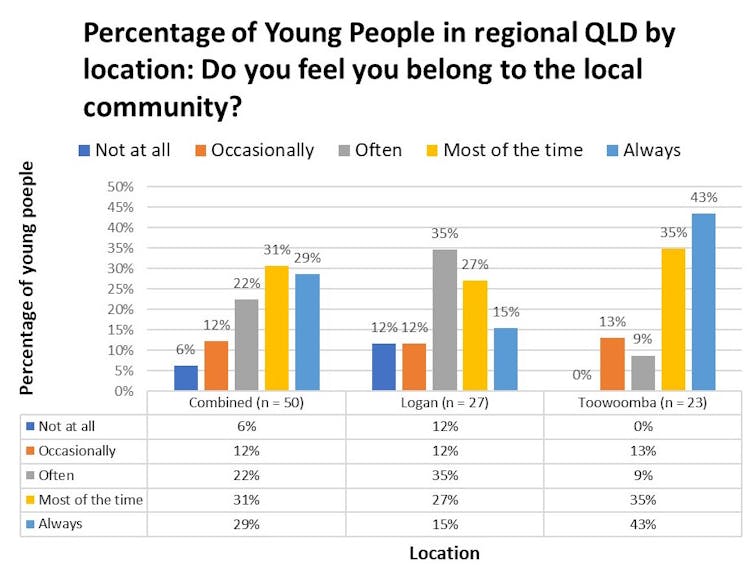
Australian Research Council, Author provided
This welcoming environment has been seen in many acts of kindness by teachers, community workers and church leaders. As one 14-year-old Afghan girl told us:
I was homesick. I was like there’s nowhere to go. We didn’t know many people around, like our own Afghanis. … So, the good thing in my life that happened last year was Ross, the pastor, came to our home and introduced us to church. Though we are not Christians, we still go there. It’s a youth group. So there we found many friends. We got to know more about other Afghanis living in Toowoomba and other cultures.
![]() At a time when the integration of immigrant communities is being questioned, this study shows new arrivals to regional areas are actually doing well, and those in communities that welcome them may have the best support of all.
At a time when the integration of immigrant communities is being questioned, this study shows new arrivals to regional areas are actually doing well, and those in communities that welcome them may have the best support of all.
Jock Collins, Professor of Social Economics, UTS Business School, University of Technology Sydney and Carol Reid, Professor, Western Sydney University
This article was originally published on The Conversation. Read the original article.
